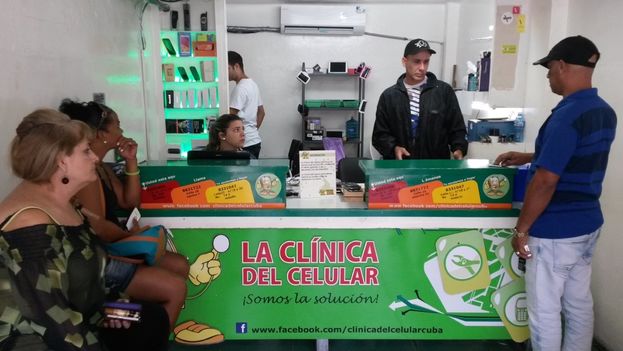
![]() 14ymedio, Zunilda Mata, Havana, 28 December 2015 – A house in Havana’s Vedado neighborhood, a German Shepherd dog, or a Rolex watch were some of the most prestigious status symbols in Cuba some years ago. But with the new technologies, these now include having a latest generation computer or cellphone. Cellphones increasingly reflect the purchasing power of their owners.
14ymedio, Zunilda Mata, Havana, 28 December 2015 – A house in Havana’s Vedado neighborhood, a German Shepherd dog, or a Rolex watch were some of the most prestigious status symbols in Cuba some years ago. But with the new technologies, these now include having a latest generation computer or cellphone. Cellphones increasingly reflect the purchasing power of their owners.
Some 800,000 new mobile phone lines have been established in the country this year, but only 324,400 physical phones have sold through the State networks. The difference suggests that more than half of the phones in customers’ hands have been acquired through illegal networks or brought in from abroad.
The limited number of models available and the high prices for cellphones in the State stores contrasts with the diversity offered by the informal market. While the illegal networks offer latest generation models and operating systems that support the installation of apps, the “Telepuntos” of the Telecommunications Company of Cuba SA (ETECSA) display a limited supply of outdated models at prohibitive prices.
“We have everything, original and Chinese imitations of almost all the phone models on the market,” says “El Micky,” a technology seller exhibiting his wares in a doorway on centrally located Carlos III Street in Havana. “Most buyers are looking for touch phones, although we also have simpler models with large keys, targeted more towards older people,” the young man explains.
Prices in the black market vary according to the performance of the device. “We have them from 15 CUC (under $20), to the iPhone 6 Plus, which is hard to find for under 450 CUC,” El Micky elaborates, adding that the most popular are the ones with removable micro SD memory because customers want, “to put their own music or videos on the phone, or save files.”
State phone offerings are a very different picture. Currently the only models available cost more than 50 CUC, are made by Alcatel, and feature technology several years out-of-date.
“Few people buy these phones, because right there in the doorway there are illegal vendors selling something cheaper and of better quality,” an employee of a State Telepunto located in the Miramar Trade Center told 14ymedio. On the other side of the window two men with a backpack where whispering what they had for sale, among them the latest Samsung Galaxy phones which just appeared in the international market.
Last Tuesday, Cuban television also addressed this issue through a report presented by journalist Manuel Lazaro Alonso. Yisel Fernandez, head of ETECSA’s marketing department, said in the program that they are selling “about five different cell phone models ranging from 37 to 166 CUC.”
State prices are related to “the quality of the products we sell. Our company is charged, of course, with finding phones with better features, better benefits,” added Fernandez. Customers, however, do not feel the same.
“I also need a phone I can use to connect in the wifi zones, and these models won’t let me do that,” said a customer who, after waiting in a long line outside the Bishop Street Telepoint found that they had run out of the device he wanted.” I’ll have to check on Revolico [Cuba’s illegal “Craiglist”] to see what I can find,” concluded the young man.
The State telephone monopoly has never offered plans that include the phone when a customer contracts for service. “Here everything has to be paid for in advance, and they don’t offer any incentives,” complained José Manuel, a 47-year-old Spaniard working for a Cuban joint venture company. “I recently managed to change my pre-paid mobile for a contract plan, but I am able to do that because I am a foreigner with a work contract here, but Cubans can’t do it.”
The problems, however, don’t end with the purchase of the physical phone. Customers complain that there are few spare parts and limited services provided by the State-owned repair shops.
Since 2008, the year when Cubans were legally allowed to open a cell phone contract, prices to activate a line have been dropping. There have also been some reductions in the cost per minute for national and international calls or for sending text messages, but cellphone service still remains a luxury for many people .
With the recent opening of the wifi hotspots that provide access to international e-mail and digital pages, the modernity and performance of handsets has become a determining factor. This is now the border that separates the true internaut from the disconnected Cuban.
